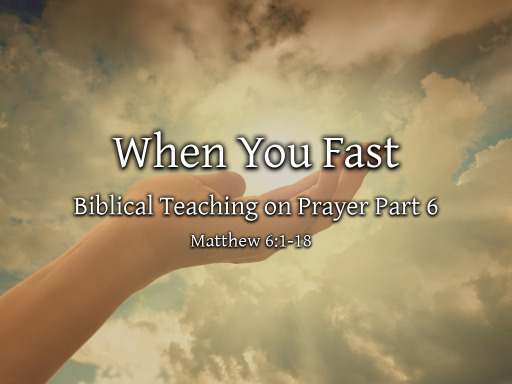Prayer Part 6: When You Fast . . . Yes, You

Notes
Transcript
Handout
Sermon Tone Analysis
A
D
F
J
S
Emotion
A
C
T
Language
O
C
E
A
E
Social
What is our intent? We want God’s blessing, to draw closer to God.
What is the obstacle? The normal activities of life get in the way of walking with God.
What is the plan? Set aside times to spend with God.
What is the result? God rewards us. This includes good health and other blessings.
Introduction:
Introduction:
Bottom Line: Fasting enrichs our lives.
Bottom Line: Fasting enrichs our lives.
God expects us to fast and rewards us for doing it.
There’s no good reason not to fast. “Fasting draws us closer to God as we voluntarily abstain from food while seeking Him.”
God blesses us when we fast.
Fasting blesses us by forcing our attention on God.
1. Fast Facts about Fasts
1. Fast Facts about Fasts
A. Voluntary Matthew 6:16, Joel 2:15-16, 2 Chronicles 20:3
A. Voluntary Matthew 6:16, Joel 2:15-16, 2 Chronicles 20:3
Individual Matthew 6:16-18
Congregational Joel 2:15-16
National 2 Chronicles 20:3
B. Fasts are when we refrain from food and sometimes water. Matthew 4:2, Daniel 1:12, Ezra 10:6, Deuteronomy 9:9
B. Fasts are when we refrain from food and sometimes water. Matthew 4:2, Daniel 1:12, Ezra 10:6, Deuteronomy 9:9
Normal fast is to refrain from food Matthew 4:2
Partial fast is to refrain from certain foods Daniel 1:12
Absolute fast is to refrain from food and water Ezra 10:6
Supernatural fast is no food or water for an extended time Deuteronomy 9:9
2. The Bible assumes we will fast. Matthew 6:16
2. The Bible assumes we will fast. Matthew 6:16
A. Compare Matthew 6:2-3 When you give
A. Compare Matthew 6:2-3 When you give
B. Compare Matthew 6:5-7 When you pray
B. Compare Matthew 6:5-7 When you pray
C. Compare Matthew 6:16 When you fast
C. Compare Matthew 6:16 When you fast
3. Times to Fast
3. Times to Fast
A. On a regular basis Lev. 16:20-31
A. On a regular basis Lev. 16:20-31
B. On special occasions Esther 4:16.
B. On special occasions Esther 4:16.
C. When seeking forgiveness Joel 2:12, 15
C. When seeking forgiveness Joel 2:12, 15
D. When seeking guidance Judges 20:26-28
D. When seeking guidance Judges 20:26-28
E. When seeking blessing Acts 14:23
E. When seeking blessing Acts 14:23
4. The results of a biblical fast
4. The results of a biblical fast
A. Reward Matt. 6:18
A. Reward Matt. 6:18
B. Rejoicing Zechariah 8:18-19
B. Rejoicing Zechariah 8:18-19
C. Health
C. Health
https://www.healthline.com/nutrition/fasting-benefits#section9
5. Practical considerations
5. Practical considerations
A. Commit
A. Commit
Make a commitment to fast, if you don’t you won’t.
Start with a partial fast, meat or sweets.
Start with short fasts and get progressively longer.
B. Expect
B. Expect
Expect difficulties such as hunger and crankiness. Use the difficulties as reminders to pray!
Expect God’s blessing. You will be personally enriched.
C. Plan
C. Plan
Set times for starting and stopping. Plan how you’re going to pray.
Discussion Questions:
Discussion Questions:
1. Is fasting something you regularly do? Why or why not?
2. We’ve all skipped a meal. Why does fasting seem hard to do?
3. Do you think we should incorporate fasting (in a way you are able) as a regular part of our worship at Longmeadow?
